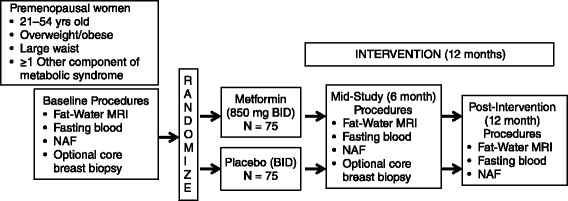Phase II study of metformin for reduction of obesity-associated breast cancer risk: a randomized controlled trial protocol
- PMID: 27430256
- PMCID: PMC4950218
- DOI: 10.1186/s12885-016-2551-3
Phase II study of metformin for reduction of obesity-associated breast cancer risk: a randomized controlled trial protocol
Abstract
Background: Two-thirds of U.S. adult women are overweight or obese. High body mass index (BMI) and adult weight gain are risk factors for a number of chronic diseases, including postmenopausal breast cancer. The higher postmenopausal breast cancer risk in women with elevated BMI is likely to be attributable to related metabolic disturbances including altered circulating sex steroid hormones and adipokines, elevated pro-inflammatory cytokines, and insulin resistance. Metformin is a widely used antidiabetic drug that has demonstrated favorable effects on metabolic disturbances and as such may lead to lower breast cancer risk in obese women. Further, the anti-proliferative effects of metformin suggest it may decrease breast density, an accepted biomarker of breast cancer risk.
Methods/design: This is a Phase II randomized, double-blind, placebo-controlled trial of metformin in overweight/obese premenopausal women who have elements of metabolic syndrome. Eligible participants will be randomized to receive metformin 850 mg BID (n = 75) or placebo (n = 75) for 12 months. The primary endpoint is change in breast density, based on magnetic resonance imaging (MRI) acquired fat-water features. Secondary outcomes include changes in serum insulin levels, serum insulin-like growth factor (IGF)-1 to insulin-like growth factor binding protein (IGFBP)-3 ratio, serum IGF-2 levels, serum testosterone levels, serum leptin to adiponectin ratio, body weight, and waist circumference. Exploratory outcomes include changes in metabolomic profiles in plasma and nipple aspirate fluid. Changes in tissue architecture as well as cellular and molecular targets in breast tissue collected in a subgroup of participants will also be explored.
Discussion: The study will evaluate whether metformin can result in favorable changes in breast density, select proteins and hormones, products of body metabolism, and body weight and composition. The study should help determine the potential breast cancer preventive activity of metformin in a growing population at risk for multiple diseases.
Trial registration: ClinicalTrials.gov Identifier: NCT02028221 . Registered on January 2, 2014. Grant #: 1R01CA172444-01A1 awarded on Sept 11, 2013.
Keywords: Biomarkers; Breast cancer prevention; Breast density; Metabolic syndrome; Metabolomics; Metformin.
Figures
References
-
- Hunter DJ, Willett WC. Diet, body size, and breast cancer. Epidemiol Rev. 1993;15:110–32. - PubMed
Publication types
MeSH terms
Substances
Associated data
Grants and funding
LinkOut - more resources
Full Text Sources
Other Literature Sources
Medical
Miscellaneous


